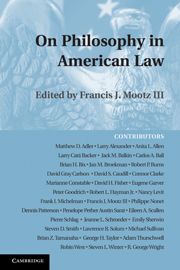Book contents
- Frontmatter
- Contents
- Introduction
- PART I KARL LLEWELLYN AND THE COURSE OF PHILOSOPHY IN AMERICAN LAW
- PART II PHILOSOPHICAL PERSPECTIVES ON LAW
- PART III AREAS OF PHILOSOPHY AND THEIR RELATIONSHIP TO LAW
- PART IV PHILOSOPHICAL EXAMINATIONS OF LEGAL ISSUES
- 18 Law as Premise
- 19 Doing Justice to Justice: Paul Ricoeur
- 20 Love Is All You Need: Freedom of Thought versus Freedom of Action
- 21 Legal Philosophy over the Next Century (While We Wait for the Personal Rocket Transportation We Were Promised)
- 22 Atmospherics: Abortion Law and Philosophy
- PART V LAW, RHETORIC, AND PRACTICE THEORY
- PART VI QUESTIONING THE RELATIONSHIP BETWEEN PHILOSOPHY AND AMERICAN LAW
- PART VII COMMENTARIES
- Contributors and Selected Bibliography
- Name Index
- References
18 - Law as Premise
Published online by Cambridge University Press: 31 July 2009
- Frontmatter
- Contents
- Introduction
- PART I KARL LLEWELLYN AND THE COURSE OF PHILOSOPHY IN AMERICAN LAW
- PART II PHILOSOPHICAL PERSPECTIVES ON LAW
- PART III AREAS OF PHILOSOPHY AND THEIR RELATIONSHIP TO LAW
- PART IV PHILOSOPHICAL EXAMINATIONS OF LEGAL ISSUES
- 18 Law as Premise
- 19 Doing Justice to Justice: Paul Ricoeur
- 20 Love Is All You Need: Freedom of Thought versus Freedom of Action
- 21 Legal Philosophy over the Next Century (While We Wait for the Personal Rocket Transportation We Were Promised)
- 22 Atmospherics: Abortion Law and Philosophy
- PART V LAW, RHETORIC, AND PRACTICE THEORY
- PART VI QUESTIONING THE RELATIONSHIP BETWEEN PHILOSOPHY AND AMERICAN LAW
- PART VII COMMENTARIES
- Contributors and Selected Bibliography
- Name Index
- References
Summary
Suppose we are passing legal judgment on the conduct of another. We want, therefore, to know what the law requires and permits of actors in the other's position in the case at hand. We don't know yet, so we shall have to conduct some sort of inquiry to find out. It happens that we are already dead certain about what morality permits and requires of the other in this case (setting aside whatever general moral obligation or pressure there may be to conform to the law as the law). What part, if any, does our prelegal moral knowledge (so to call it) play in our inquiry into the regulative content of the situationally applicable law?
A possible answer, in some ways quite appealing, is “none at all.” Legal content, we might then say, is whatever authorized lawmakers decide to make it. Authorized lawmakers may or may not have conformed the applicable law for this case to the applicable moral permissions and requirements. If they did not, the product of their law-making activity is no less the law than if they had. If we wish to follow the law, our task is to find out what they did; never mind what morality would have had them do. Law is one thing, morality is another.
Contentious as this strict separationist view may be in some quarters, it nevertheless infiltrates almost everyone's thought about what it means to find and follow the law. But making the law is something else entirely.
- Type
- Chapter
- Information
- On Philosophy in American Law , pp. 151 - 158Publisher: Cambridge University PressPrint publication year: 2009



